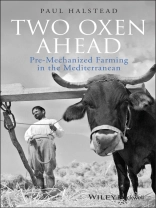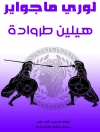TWO OXEN AHEAD
This revealing study of farming practices in societies around the Mediterranean draws out the valuable contribution that knowledge of recent practices can make to our understanding of husbandry in prehistoric and Greco-Roman times. It reflects increased academic interest in the formative influence of farming regimes on the societies they were designed to feed. The author’s intensive research took him to farming communities around the Mediterranean, where he recorded observational and interview data on differing farming strategies and practices, many of which can be traced back to classical antiquity or earlier.
The book documents these variables, through the annual chaîne opératoire (from ploughing and sowing to harvesting and threshing), interannual schemes of crop rotation and husbandry, and the generational cycle of household development. It traces the interdependence of these successive stages and explores how cultural tradition, ecological conditions, and access to resources shape variability in husbandry practice. Each chapter identifies ways in which heuristic use of data on recent farming can shed light on ancient practices and societies.
Cuprins
Preface viii
Acknowledgments x
1 Introduction: Mediterranean Farming between Longue Durée and Contingency 1
1.1 Fieldwork 3
1.2 Scales of Analysis 8
2 Working the Earth: Tillage and Sowing 11
2.1 Two-Oxen Households in Paliambela 14
2.2 Scratching a Living in the Hills of Messenia 19
2.3 Tillage Time and Sowing Season from Assiros to Asturias 21
2.4 Juggling with Seedcorn 28
2.5 Flexible Farmers 31
2.6 Ard, Hoe, and Scale of Cultivation 33
2.6.1 Ard versus hoe: Benefits 33
2.6.2 Ard versus hoe: Costs 47
2.6.3 On balance: Hoe or ard, cows or oxen? 55
2.7 Tillage and Sowing in the Past 57
3 Harvest Time 67
3.1 Amorgos: From Field to Threshing Floor 68
3.2 When to Reap 71
3.3 What and How to Reap 77
3.4 After Reaping: Binding, Drying, and Transporting the Harvest 89
3.5 Who and How Many to Reap 102
3.6 Harvest Ceremonies 112
3.7 Reaping in the Past 113
4 Sorting the Wheat from the Chaff 127
4.1 Amorgos: On and After the Threshing Floor 127
4.2 Ways of Threshing 136
4.3 Ways of Winnowing and Coarse Sieving 151
4.4 Cleaning for Storage and Consumption 154
4.5 Storage 157
4.6 Consumption 163
4.7 Questions of Scale: Labor and Time Stress 166
4.8 Threshing Floor Customs 173
4.9 Crop Processing in the Past 174
5 Managing the Land: Coping with Failure and Planning for Success 191
5.1 Watching the Corn Grow 191
5.2 Planning for Success: Fallowing and Rotation 199
5.2.1 Fallowing 199
5.2.2 Crop rotation 201
5.2.3 Fallowing and rotation in space 206
5.2.4 Hedging bets: Mixed cropping 210
5.3 Planning for Success: Manuring 212
5.3.1 Stall manure 213
5.3.2 Manuring by folded livestock 226
5.3.3 Manuring by grazing livestock 229
5.4 Planning for Success, Mitigating Failure: Irrigation 230
5.5 Averting Failure: Weeding 233
5.6 Crop Husbandry and Crop Yields 238
5.7 Crop Husbandry and Yields in the Past 244
6 Family Planning: Land, Labor and Livestock 259
6.1 Clearance 260
6.1.1 Uprooting deciduous woodland in lowland northern Greece 260
6.1.2 Opening up the maquis in southern Greece 264
6.1.3 Shifting cultivation: From Crete to Asturias 267
6.1.4 Slashing, burning, and shifting 269
6.2 Long-Term Improvement: Deep Tillage, Terracing, and Enclosure 271
6.3 Extending and Improving Cultivable Land: Drainage and Irrigation 277
6.4 Counting the Cost of Extension and Improvement 281
6.5 Subsistence and Cash Crops 283
6.6 Mixed Farming: Livestock 289
6.7 Labor, Land, and Livestock: The Domestic Cycle 295
6.8 Household and Community 304
6.9 Land, Labor, and Livestock in the Past 311
7 Homo agronomicus? Mediterranean Farming, Present and Past 329
7.1 Analogies for the Past: ‘Matters of Fact’ and ‘Matters of Interest’ 330
7.2 Cultural Reason 332
7.3 Environmental and Technological Constraints 336
7.4 Practical Reason: Costs, Benefits, and Knowledgeable Farmers 338
7.5 Ancient Farmers: Knowledgeable and Rational? 346
7.6 Farming in the Mediterranean: Analogy and Change 347
Glossary 360
Index 362
Despre autor
Paul Halstead is Professor of Archaeology at the University of Sheffield, UK. He has edited and contributed to numerous publications, including Food, Cuisine and Society in Prehistoric Greece (with John Barrett, 2004), Neolithic Society in Greece (1999), and Bad Year Economics (with John O’Shea, 1989).












